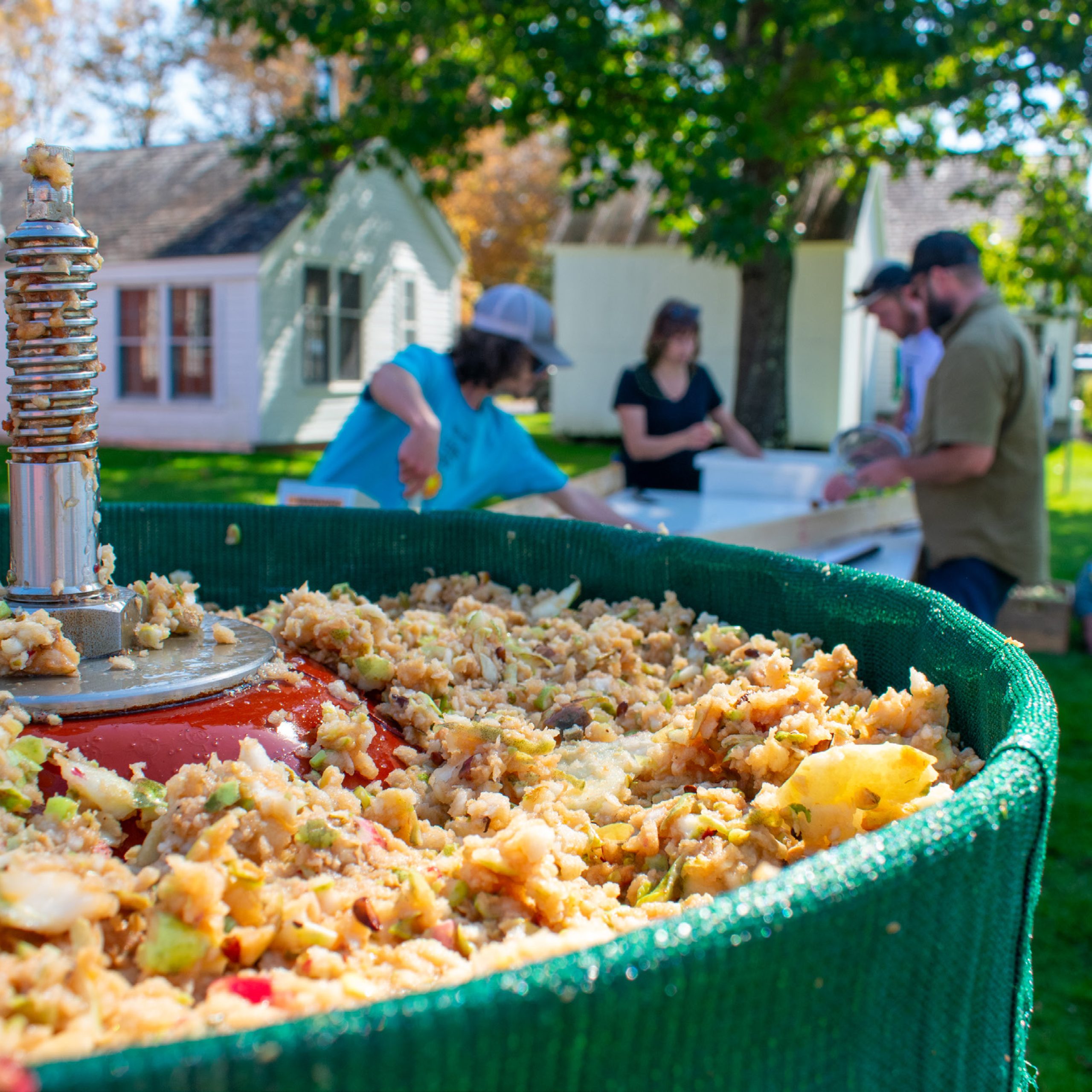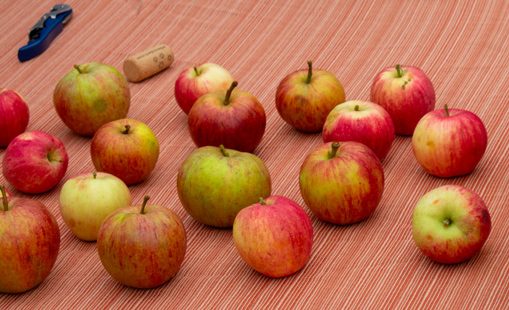STORY BY MEGAN DEMAREST
PHOTOGRAPHY CRAIG LIGHT
Watson Wheeler Cider in Shaftsbury combines a generational history of hard cider-making with a hip, refined design, and a strong foundation for the future of their business.

Cider making is a long-held tradition, not only in Vermont, but all over the world where apple trees grow. The history of recorded cider making traces back to the Roman era, circa 55 BCE. Apple trees grew all over Asia and Europe, and eventually the seeds traveled across the ocean to the new colonies. In colonial America, cider was often a safer alternative to water, which could easily become contaminated. Apple juice, both fresh and fermented, offered hydration, calories, and nutrients, and it was very common for New England households to have their own cider making operation. The abundance of apple orchards in Vermont has facilitated fresh and hard cider production for generations on farms and homesteads across the state. The fledgling company Watson Wheeler Cider (WWC) in Shaftsbury exemplifies the rich history of cider in Southern Vermont and shows both novice and experienced hard cider enthusiasts what their take on the traditional beverage has to offer a modern palate.
The seed for Watson Wheeler Cider was planted when two young families who hadn’t met, but shared uncanny similarities, moved to Shaftsbury from New York City within a year of each other – and within a couple miles of each other. Ally Rotondo and Cein Watson moved with their young daughter, Estelle, to Cein’s family home in Shaftsbury, and about a year later, Bleecker and Jenn Wheeler moved up the road with their young daughter, Pilot. Driving by the Rotondo-Watson homestead one day, Bleecker’s mother recognized Cein as her friend Ellen’s grandson and thought the two couples might like to meet, especially since they both had daughters the same age. The two families were eager to get together, and it didn’t take long for them to acknowledge their remarkable connections or to forge lasting friendships. Cein and Bleecker are both carpenters with fine arts degrees and both families are comprised of artists who enjoy experimenting with making hard cider at home. The couples also got married on the exact same weekend in Vermont, at different lakes, and had their first children around the same time in New York City. The parallel lives they had been living finally came together in Shaftsbury, and whether one believes in fate or not, it’s hard to argue that this union wasn’t meant to be.
Bleecker’s parents bought their Shaftsbury property in 1978, which already had a modest number of apple trees. His dad would get their apples pressed at Propagation Piece Orchard on Route 7A. Though born in Vermont, Bleecker grew up in Boston, but spent holidays and summers in Shaftsbury. “Every fall, the whole family would get together, pick all the apple trees, and press the apples. We’d freeze half gallon jugs and drink the fresh cider throughout the year,” remembers Bleecker. Sometime after he turned 21, he bought the equipment needed to start fermenting his own hard cider. “It was pretty terrible, at first; I’m not going to lie,” he admits. “But I was addicted to the process right away. Every year, I would make a small batch of hard cider and we made a bunch for our wedding in 2018. Instead of doing a champagne toast during the reception, we all toasted with glasses of hard cider.” Now, all these years later, that property is the year ‘round home to Bleecker, Jenn, Pilot, and the newest addition to the family, Gideon.

Cein’s family also has long-standing ties to Vermont, extending back much further. The Watsons go back seven generations, and Cein, Ally, Estelle, and their second daughter, Vada, now live on the Shaftsbury property that has been in his mother’s family, the Elwells, for nine generations. Built in 1779, the homestead needed a great deal of work when they acquired it, but the wild Glasten Orchards were in beautiful condition and had been yielding fruit for well over 100 years, providing cider to the Elwells across generations. After sending seeds from their orchard for testing, it was confirmed that their apples are a unique species that exists nowhere else. Sweetly, it was named the “Estelle.” In the same spirit, one of the Watson Wheeler ciders is named after Cein’s 3rd great grandfather, Martin Elwell, nicknamed “The Town Fiddler,” who played a mean fiddle back in the 19th century at Shaftsbury’s Matteson Tavern. The bottle boasts a lovely fiddle rendered by Cein, who has a master’s degree in printmaking. He designs all their distinctive labels. And of course, it has Estelle apples in it.
Since both families were making their own hard cider when they met, it seemed a natural progression to join forces and create a business. Bleecker and Jenn approached Cein with the idea, and he said “yes” without hesitation. “Jenn wrote our business plan, and it was brilliant,” says Ally. “That really helped connect us all together.” Jenn is a professional photographer and had worked for the Aloha Foundation in Fairlee, VT as their Director of Photography for over 15 years before making the switch full time to be head of administration for WWC. Ally still works full-time at the Stratton Mountain Resort in lodging but coordinates all their sales and marketing at farmers markets and local groceries. Making it truly a family affair, Ally’s cousin, Rachael, and Rachael’s husband, Bill, prepared the pairing bites to accompany the cider tasting at the WWC official launch party, held at The Inn at Manchester in August. “The tasting was so thoughtful; they found the right cider to go with the chocolate we got from The Chocolate Barn in Shaftsbury,” says Bleecker. “All the ingredients were local.” The cheeses were from Vermont, the meats were from Fortuna Italian Market in Sandgate, and the bread came from Earth, Sky, Time Farm in Manchester.
Even with the larger orchard on the Watson property and the smaller orchard on the Wheeler property, there aren’t enough apple trees to produce the amount of fruit needed for their expanding business. Keeping it local, the families go foraging for apples in neighboring orchards and, with permission, in parts of the Green Mountain National Forest (GMNF), where they’ve been able to locate old orchards and graft some of the trees to keep specific apple varieties from going extinct. They always leave about 20% of their findings behind for the forest wildlife. It’s a reciprocal relationship that keeps the business, the apples, and the ecosystem thriving. “Part of our process is doing research and finding where the old homesteads were, which historically often had orchards. When we forage and go up into the mountains, we find old foundations, old cemeteries, and then we tap into the history of the apples in the area,” explains Cein. “People are so excited when we tell them what we’re doing and want to be a part of it” adds Ally. “We’re focused on putting a lot of pride into the area and into the cider.” Which explains why each of the Watson Wheeler ciders tells its own local story. In addition to the Town Fiddler, there is the Bennington Triangle, made from apples foraged in the infamous area of Bennington County where many hikers have mysteriously disappeared over the years. Or, Spring Omen, which translates to “Elwell” in Old English. There are stories spun into every bottle.
Handmade hard cider makers are equal parts horticulturalists, chefs, and alchemists, as the craft lends itself to experimentation and expertise in all those fields. Apples are genetically diverse, which means that planting a seed from a favorite apple will not produce that same apple once the tree grows and produces fruit. To regrow an apple variety, it must be grafted from the original tree and cultivated into a new tree, as they’ve been doing with their GMNF discoveries. This will also enable them to recreate their favorite cider blends. And blends of apples are indeed the key to making a balanced cider with tart, bitter, and sweet notes folded in together that dance nicely on the tongue.

Modern cideries like Watson Wheeler emphasize that their spirit is more like wine, despite commercial marketing comparisons to beer. Ally explains it well: “If you’re from France, you have a connection to wine because it’s from the area. We have that with apples. When you taste it, it’s fresh, leaves you feeling light, and doesn’t overpower your meal. We’re trying to get people to think of cider as more like a wine than an alternative to beer.” This is evident in the packaging of WWC’s small-batch blends, which are poured into 750 ml glass bottles with beautiful, refined artwork on the labels. It’s even more evident in the taste, which has all the complexities of a good bottle of wine, yielding the most harmonious flavor combinations.
Watson Wheeler Cider is a young company with deep roots, poised to become a staple of the Southern Vermont cider scene. They’ve quickly been building community by selling their blends at popular events like Cider Terra and the Southern Vermont Art and Craft Festival and envision building a formal tasting room in the future. Current selections are on sale at over a dozen local restaurants and markets, while new ciders are fermenting, looking forward to seasonal unveilings. For the perfect contribution to a dinner party, a great toast for a special occasion, or a meaningful holiday gift, consider a unique cider that literally brings something different to the table. Each Watson Wheeler Cider blend tells a story, holding within it a history and a taste of the region that can only come from the apples grown in this terroir, in the Shires of Vermont, by these two special families.
ALL THE DETAILS
WATSONWHEELERCIDER.COM

